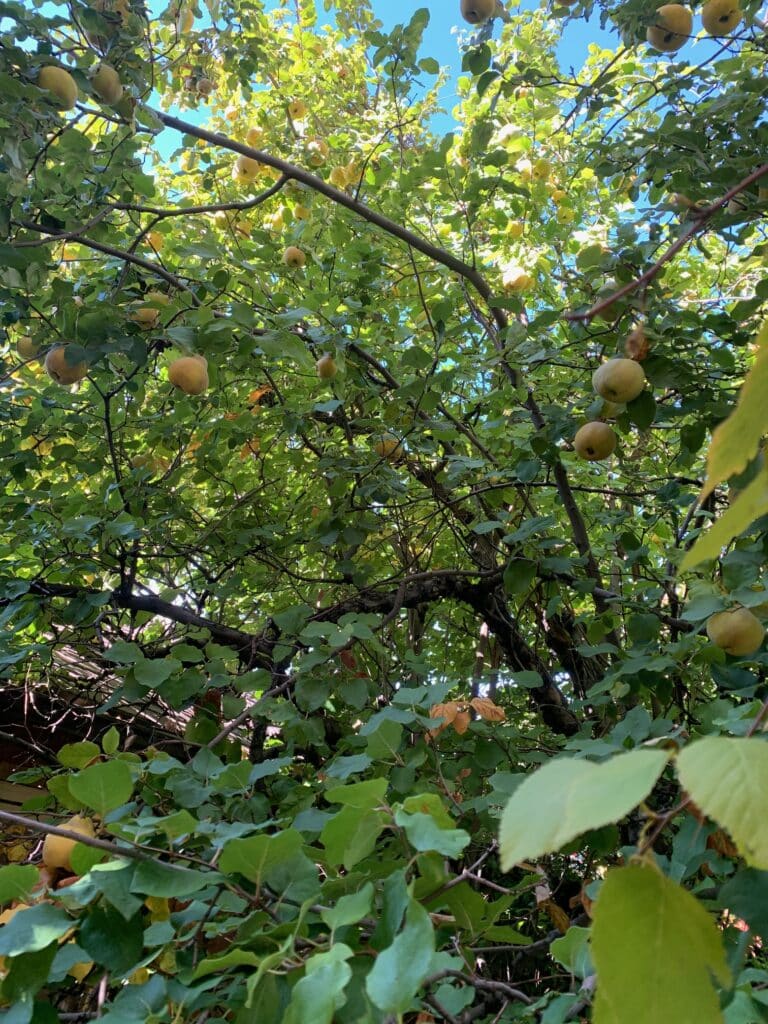Each fall, when we say goodbye to figs, stone fruit, and berries, we look towards the colder months and start brainstorming how we’ll stay warm. While soups are an easy fix, one particular fall fruit likes to challenge us to be creative in the kitchen and warm up in ways we never thought we could before. Enter, Quince. A fruit maybe only your great-grandparents could identify, quince was once a very popular canning fruit across the United States. Today, they are more of a rarity, but quince trees can be found in yards across Utah, which is exactly where we source our precious quince each season.
Quince is a very firm, softball-sized fruit with a yellow skin covered in light pollen fuzz. It is deliciously aromatic – in fact, some cultures keep quince as a tablepiece just to make their homes smell like a beautiful bouquet! The taste of quince is citrusy, but gentler and without the sharpness of a lime or lemon.
How to Eat Quince
Traditionally in the United States, quince fruits are used to make light tarts and jams due to their high pectin content. Last Thanksgiving, I cooked down a few quince with apples to make a rosey apple sauce.
On the Iberian Peninsula, quince is cooked down into a dense paste called carne de membrillo or dulce de membrillo. Membrillo is not – as I once assumed from a poor translation at a Spanish dinner table – animal brains. It’s a sweet addition to cheese (traditionally Manchego) or sandwiches, and is easy to cut into small cubes or slices for easy serving.
In Chile, boiled quince is popular in desserts such as the murta con membrillo that combines Chilean guava with quince.
In North Africa and the Middle East, quince is a lovely way to add aroma and a delicate sweetness to meat dishes like tagines and stews.

Can you eat quince raw? Sure, you *can* do a lot of things with quince, but should you? Personally, I would not eat quince raw. I don’t think my teeth are strong enough and while I’m known to drink Malort on occassion, I wouldn’t submit myself to the bitter and astringent experience of raw quince when trying to enjoy fruit. However, I did meet a Central American shopper at the farmer’s market who told me that she loved eating quince raw as a child – only after smashing it against a wall multiple times to soften it up. And after some searching on the internet, I learned there are certain quince varieties that are more palletable when eaten fresh. So I repeat, the quince we have on our shelves I would not eat raw.
Quince season won’t last forever, but preserved quince (nearly) will! We currently carry Membrillo from Spain, Quince Jam from Italy, and a Quince Jelly made right down the street by our friends at Amour Spreads. Try any of these quince preserves alongside our Cheese Highlight of the week: Anabasque.
This Week's SFF Spotlight: Anabasque
Landmark Creamery is run by two incredible women named Anna. Anna Landmark and Anna Thomas Bates have been curating creamy sheep milk and buttery pasture-grazed cows milk into handcrafted, beautiful, and delicious cheese out of Belleville, Wisconsin since 2013. What started as two women fighting to milk two feisty goats and a shorthorn cow has evolved into a farmside chemistry lab involving calculations and carefully balanced pH levels to create the perfect Wisconsin cheeses.
Anabasque is one of these perfect cheeses. Taking inspiration from the mountain cheeses in the Basque region of Spain, this cheese strikes the perfect balance between fruity and salty. A Wisconsin style homage to Ossau Iraty, expect a sweet aroma, mild salt, and hints of ewe’s milk. Perfect to pair with fresh sliced figs & Marcona almonds, both of which are available at Liberty Heights Fresh.
What’s a Sustainably Farmed Food (SFF) Share?
Our Sustainably Farmed Food Share (SFF for short) program is a CSA-style food share subscription. Subscribers receive a bag filled with organically grown and ethically raised food items every week. Unlike a traditional CSA, our SFF program is avialable all year long and has options to add items like artisan cheeses, ethically raise meats, farm fresh eggs, fresh-squeezed organic orange juice, and more! We upload recipes and details about the delicious items going into your share each week on our What’s In The Bag.
Learn more about this opportunity to support organic farming and local businesses

